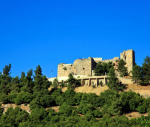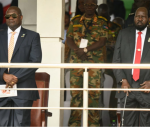You are here
Disappointing deal
Jul 01,2016 - Last updated at Jul 01,2016
A reconciliation agreement reached in Rome, hoping to revive relations between Turkey and Israel after an Israeli assault, six years ago, on a Gaza-bound Turkish boat with aid for the besieged Palestinians apparently fell short of regional and international expectations.
Turkey had severed ties with Israel, led by ultra-rightwing Prime Minister Benjamin Netanyahu, after its ship, Mavi Marmara, sailing in international waters to the Palestinian port of Gaza, in the East Mediterranean, was attacked by Israel. The attack left 10 Turkish activists dead.
Nothing changed since. The Israeli prime minister said in Rome that Israel’s blockade of Gaza Strip will remain, reported Allison Deger of Mondoweiss.net.
“This is our supreme security interest; I was not prepared to compromise on it,” said Netanyahu speaking to reporters in Ankara, adding that “Turkey’s Prime Minister Binali Yildirim alluded to a lessening of Israeli restrictions over Gaza — which were not guaranteed by Israel in the talks”.
Surprisingly, Hamas, the Palestinian group in control of Gaza, failed to comment about the Turkish-Israeli deal.
Khaled Mishaal, a senior Hamas leader, met with Turkish President Recep Tayyip Erdogan, but no details were released about the surprise meeting.
Palestinians in Gaza Strip were disappointed with the deal, particularly since it leaves them under “a suffocating siege”, as Ali Abunimah wrote in Electronic Intifada, a Chicago-based website.
Abunimah said an unidentified Israeli human rights group also confirmed that the deal does not end Israel’s tight control over the strip, which has exacerbated the devastation “to Gaza’s economy and society from three major Israeli military assaults since 2008”.
Gisha, an Israeli human rights group that monitors Israel’s blockade of Gaza, said the deal did nothing to challenge Israel’s “shameful” control over the lives of 1.9 million Palestinians in Gaza.
The Turkish prime minister conceded that Gaza’s border will remain under Israeli control, but said that the agreement stipulates that a hospital, a power plant and a water sanitisation facility will be built by the Turkish government in the strip; Turkey will also finance an industrial zone in the northern West Bank.
Furthermore, Israel will pay $20 million in reparations for the death of the Turkish citizens on board the ship.
A Turkish charity organisation known as IHH also released a 15-point criticism of the agreement.
It underlined that “humanitarian aid in Gaza is only part of the issue. In Gaza the problem is mainly freedom”.
Noteworthy is the extent of the defence relationship between Turkey and Israel.
By 2005, Turkey had reportedly become one of Israel’s largest defence export markets.
Major programmes included a $700 million upgrade of the Turkish Air Force’s F-4E Phantom fighters; a $668 million M60AI upgrade of tank for the Turkish army, and sales of radar, electro-optical sensors, munition and command-and-control systems.
Yosi Ben-Hanan, a former director of defence exports and international cooperation at Israel’s ministry of defence, estimated that during peace years, Turkish defence procurement from Israel amounted to several hundred millions of dollars annually.
But today, given Turkey’s pro-Islamist policies and ongoing tension with Egypt, Jordan and many Arabian Gulf states, Ben-Hanan said it remains to be seen whether Israel and Turkey could come close to the level of ties they enjoyed more than a decade ago.
“It’s too early to tell what Turkey wants to achieve in this region and whether its interests are compatible with our own,” he said.
A Washington Post report said that unidentified experts did not anticipate a return to the intimate alliance of past decades, when the navies of Israel, Turkey and the US carried out joint exercises in the Mediterranean, and Israeli fighter jets trained in Turkish airspace.
On the other hand, The New York Times reported that Israel also hopes the agreement with Turkey, which shares a border with Iran, “will curb the rising power of its archrival, Iran, which recently struck a landmark nuclear deal with the West”.
The writer is a Washington-based columnist.













